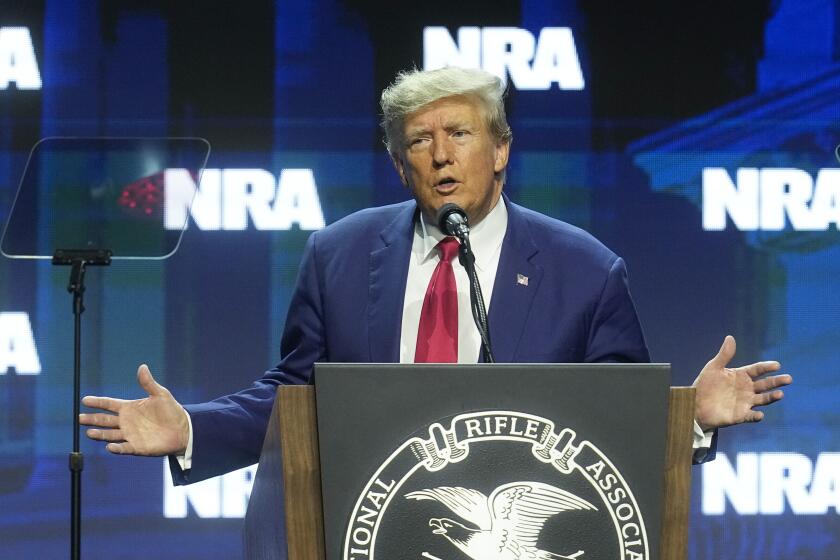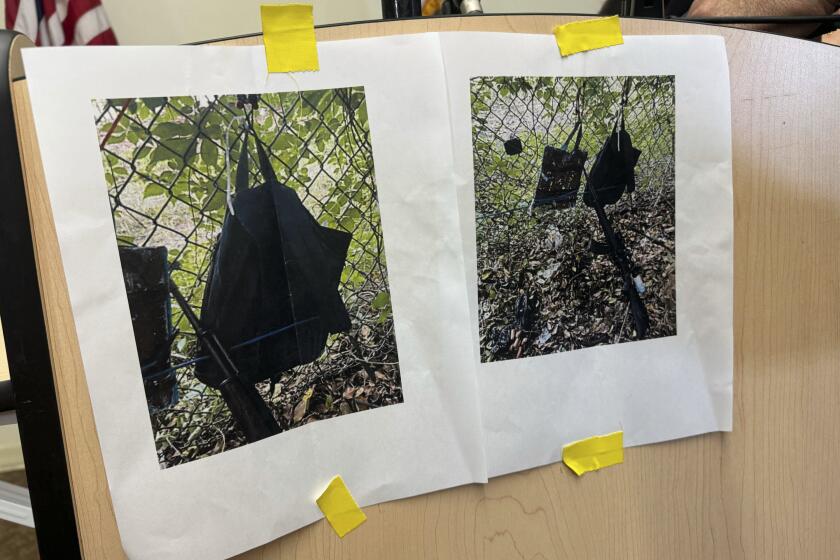Opinion: Don’t underestimate threats of violence from Proud Boys and other right-wing groups

- Share via
Remember during the 2020 presidential race when Donald Trump refused to disown right-wing violent extremists, instead telling the Proud Boys to “stand back and stand by”? We might now know what they’ve been standing by for.
After the rioters at the U.S. Capitol failed to disrupt the transfer of the presidency a few months later, and the nation turned its attention elsewhere, American University’s Cynthia Miller-Idriss warned in an interview with the New York Times: “A lot of people want to see Jan. 6 as the end of something. I think we have to consider the possibility that this was the beginning of something.” But then came successful prosecutions of many of the participants — people who “saw themselves as Donald Trump’s Army,” the prosecution said — yielding more than 1,000 convictions as of this month. The sense grew that the worst of mob violence was behind us.
Not so. Recent investigations have shown that right-wing militias generally, and the Proud Boys in particular, are reorganizing, perhaps with more supporters than ever. The Proud Boys recently marched in Springfield, Ohio, after the Trump campaign spread false claims about immigrants who live there. One reporter wrote in the Nation that such groups may evolve into America’s version of the violent mobs that helped bring Adolf Hitler to power in Germany and helped elevate Benito Mussolini in Italy.
Republicans’ violent speech and gun proliferation are a recipe for bloodshed, one that’s targeted Democrats for years. Expect a spike regardless of who wins in November.
It’s important to understand just how violent these groups are. Our research team at UC Davis has conducted a large, annual, nationally representative survey on support for and willingness to engage in political violence since 2022. That year we gathered data directly from supporters of the Proud Boys and the militia movement (and six other right-wing extremist organizations and social movements). The findings are staggering.
More than 40% of the Proud Boys and militia supporters we surveyed thought that “having a strong leader for America [was] more important than having a democracy,” and majorities thought the 2020 election had been stolen from Donald Trump. More than a third thought that violence was justified to return Trump to the presidency — in 2022. They were endorsing the violent overthrow of a legitimately elected government that had been in office for more than a year.
More than 40% thought that armed citizens should patrol polling places, and 23% of Proud Boys and 30% of militia supporters said that violence (which we defined as “physical force strong enough that it could cause pain or injury to a person”) was usually or always justified “to stop people who do not share my beliefs from voting.” More than 30% said that violence was usually or always justified “in general…to advance an important political objective that you support.”
It gets worse. Nearly 30% of Proud Boys supporters and 45% of militia supporters expected to be armed with a gun in a future situation for which they thought political violence was justified. Perhaps most troubling, nearly 20% of Proud Boys supporters and 28% of militia supporters said that they were very or completely willing to kill someone to advance an important political objective.
What does this portend? One obvious possibility is that pro-Trump mobs will seek to sway this year’s elections by intimidating voters and election officials.
Trump and his defenders aren’t against allegedly violence-inciting rhetoric, they’re against such rhetoric deployed against Trump. When it targets Biden and Harris it’s just fine.
It’s hard to imagine candidate Trump setting limits on such activity, given his previous social media posts calling to “liberate” state capitols from their elected leaders, as well as recent plans from his campaign and the Republican National Committee to deploy more than 100,000 poll watchers. If Trump were to lose the election, right-wing organizations might use violence in an effort to install him in the White House nonetheless. This would bring them up against the nation’s formidable law enforcement capabilities, however, and they would almost certainly be unsuccessful.
The more concerning possibility arises if Trump is elected. In that case, Proud Boys and other right-wing extremists could become part of those enforcement capabilities. The Washington Post reported plans for a second Trump administration to possibly invoke the Insurrection Act on its first day in office and deploy federal law enforcement and the military against American civilians. In war-game simulations led by the Brennan Center for Justice to test what might happen during a second Trump presidency, experts predicted that an authoritarian president would deputize private militia members as federal marshals, one of the center’s senior advisors told me.
A President Trump might well authorize these new deputy marshals to use whatever force they deemed necessary to achieve his objectives. This is the man who as president in 2020 asked the chairman of the Joint Chiefs of Staff, “Can’t you just shoot [protesters], just shoot them in the legs or something?” He might make an advance offer of pardons for offenses committed along the way; he’s already offered to pardon Jan. 6 rioters. And thanks to the Supreme Court’s July ruling on election subversion charges against him, a President Trump would have broad immunity from prosecution for acts committed while in office.
My team’s research frequently provides grounds for optimism: The vast majority of Americans reject political violence; those who endorse it in principle are largely unwilling to participate personally; and those who say they would participate are frequently willing to change their minds if urged to do so by family members and others.
But here, the only bright spot from our research is that supporters of the Proud Boys and the militia movement account for just over 2% of the adult population. The United States is a big country, though — each percentage point represents some 2.5 million people. Imagine just a few thousand of them, willing to use lethal violence to advance the objectives of an authoritarian president, newly deputized as part of federal law enforcement.
As a political violence researcher, I’m very concerned by this possibility. All of us can play a part in prevention efforts, urging those who might participate in political violence to change their minds and following the old maxim, “If you see something, say something.” But these efforts may not always succeed. As an emergency medicine physician at a major city trauma center, I’m going to make sure my hospital is ready.
Garen Wintemute is a distinguished professor of emergency medicine at UC Davis and director of the university’s Violence Prevention Research Program.
More to Read
A cure for the common opinion
Get thought-provoking perspectives with our weekly newsletter.
You may occasionally receive promotional content from the Los Angeles Times.










